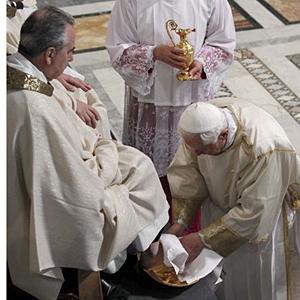 “…God has shown himself, because he, infinite and beyond the grasp of our reason, is the God who is close to us, who loves us, and whom we can know and love.
“…God has shown himself, because he, infinite and beyond the grasp of our reason, is the God who is close to us, who loves us, and whom we can know and love.
Jesus prays for the Church to be one and apostolic. This prayer, then, is properly speaking an act which founds the Church. The Lord prays to the Father for the Church. She is born of the prayer of Jesus and through the preaching of the Apostles, who make known God’s name and introduce men and women into the fellowship of love with God. Jesus thus prays that the preaching of the disciples will continue for all time, that it will gather together men and women who know God and the one he has sent, his Son Jesus Christ. He prays that men and women may be led to faith and, through faith, to love. He asks the Father that these believers “be in us” (v. 21); that they will live, in other words, in interior communion with God and Jesus Christ, and that this inward being in communion with God may give rise to visible unity. Twice the Lord says that this unity should make the world believe in the mission of Jesus. It must thus be a unity which can be seen – a unity which so transcends ordinary human possibilities as to become a sign before the world and to authenticate the mission of Jesus Christ. Jesus’ prayer gives us the assurance that the preaching of the Apostles will never fail throughout history; that it will always awaken faith and gather men and women into unity – into a unity which becomes a testimony to the mission of Jesus Christ. But this prayer also challenges us to a constant examination of conscience. At this hour the Lord is asking us: are you living, through faith, in fellowship with me and thus in fellowship with God? Or are you rather living for yourself, and thus apart from faith? And are you not thus guilty of the inconsistency which obscures my mission in the world and prevents men and women from encountering God’s love? It was part of the historical Passion of Jesus, and remains part of his ongoing Passion throughout history, that he saw, and even now continues to see, all that threatens and destroys unity. As we meditate on the Passion of the Lord, let us also feel Jesus’ pain at the way that we contradict his prayer, that we resist his love, that we oppose the unity which should bear witness before the world to his mission.
Pope Benedict XVI
Holy Thursday 2010, excerpt of homily